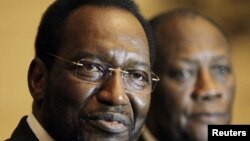DAKAR -- Mali's interim president Diouncounda Traore returned to Bamako Friday, more than two months after he was beaten by protesters in his office and sought treatment in France.
Traore returns home to a hefty workload, facing a deepening post-coup political crisis in the capital and mounting pressure to wrest the northern part of the country from al-Qaida-linked Islamist militants.
Regional bloc ECOWAS (Economic Community of West African States) wants him to revamp his transitional government into a "government of national unity" by July 31. Until now, his weak and unpopular interim government has been subject to meddling by the short-lived military junta that ousted the country's elected government on March 22.
Traore also must decide what to do about interim prime minister, Cheikh Modibo Diarra, an astrophysicist and political outsider whose resignation is being demanded by a key political coalition, which includes Traore's own party, on charges of incompetence.
Philosophy professor Issa Ndiaye, a Malian political analyst, says some in Bamako would like to start over and form a new transitional authority.
"The interim government appears to be drawing from the same, old closed circle of political elite to form this supposed government of national unity," he said via translator. "This formula of making appointments based on personal loyalty has plagued Mali for years and is doomed to fail."
Ndiaye says the only way to create a government of national unity that will enjoy broad popular support is to draw "new faces" from civil society, labor unions and other social segments.
While few Malians mourned the abrupt removal of former president Amadou Toumani Toure by military coup, Traore's ties to the ousted leader have been a liability.
Mali's transitional civilian government was put in place April 12 following regional mediation, and Traore left Mali after being severely beaten by pro-junta protesters May 21.
In his absence, heavily-armed al-Qaida-linked militants have solidified their hold on the northern half of the country; the militants seized the territory, along with Tuareg rebels, in the chaotic days that followed the coup in Bamako.
Traore is expected to formally request a United Nations Security Council mandate for a regional intervention force.
ECOWAS officials call the mandate the only remaining hurdle to deployment of its 3,000-person standby force.
According to Salamatu Hussaini Suleiman, the regional bloc's political affairs commissioner, the ECOWAS force has a three-part mandate: to assist in the reorganization of the Malian army following the coup, to support Malian troops in retaking the North, and to secure the political transition.
"You'll all remember what happened in the past when the interim president was assaulted, so those kinds of issues will not occur once we have a standby force in place in Mali," said Suleiman.
But Traore could face resistance from Malians who oppose deployment of foreign troops on their soil and resent ECOWAS' heavy-handed mediation of the events that followed the coup.
Analysts say any attempt to retake the North before first resolving the political crisis in Bamako is doomed to create more chaos.
But momentum continues to grow behind a regional military offensive: Malian self-defense militias say they are mobilizing thousands of volunteers to retake the North with or without Bamako's support.
Western and African authorities fear the region will become a terrorist haven, a so-called Afghanistan in Africa. The United States and France have both indicated they would provide logistical support to an African-led intervention in the north.













